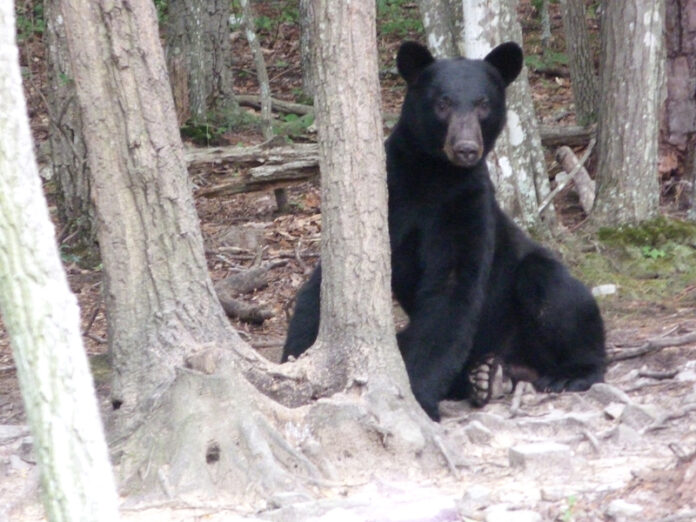
Two healthy young Virginia black bears face a lifetime of confinement – or worse – because they are habituated to humans. These bears have lost their natural distrust of people, likely because they were illegally held when they were small cubs. One of the bears, a male, had been kept in a home for 30 days. The history of the other bear, a female, is less certain, but she demonstrates many of the characteristics of a young bear kept in close contact with humans.
These two bears were picked up by the Virginia Department of Game and Inland Fisheries (VDGIF) last spring and taken to the Wildlife Center of Virginia (WCV) in Waynesboro. While at the WCV, interaction with humans was extremely limited, but the damage had been done. Bears are incredibly smart and adaptable to a wide range of conditions. After being reared by humans, young bears reach a point of no return where they have lost their innate mistrust of people and cannot be rehabilitated for release.
The VDGIF and the WCV are now searching for placement of these bears into suitable facilities that can house bears in an appropriate natural and enriching environment for the duration of a life that can exceed 30 years. There are relatively few qualified facilities with room for additional bears, and no shortage of black bears in North America. If a suitable facility for these bears cannot be found, there will be no option but to euthanize them.
Unfortunately, this situation is not unique. Over the last few years, VDGIF and WCV have received multiple bear cubs that have been held illegally in people’s homes, backyards, and dog kennels. In addition to being a violation of the law, this practice is a critical violation of these animals’ welfare, seriously compromising their chances for return to the wild. While most of the people who find and keep these cubs may believe they are helping, in reality they are selfishly preventing these bears from ever having a chance to live the life of a wild and free animal.
According to WCV President Ed Clark, “These cubs are the victims of criminal human self-indulgence, yet it is often the bears who end up being sentenced to life in prison. Even if we can find them a home in a world-class zoo—something increasingly difficult to do—their freedom has been stolen from them.”
Both the WCV and VDGIF recognize the importance of assisting bear cubs that have been truly orphaned and are unable to survive on their own without assistance. During the last few years, VDGIF has funded and reinforced strong partnerships with the WCV, and the Black Bear Research Center at Virginia Tech, to aid in the rearing and rehabilitation of orphaned bear cubs. With the assistance of VDGIF, the WCV completed a new facility in 2013 dedicated solely to raising dependent orphan cubs for release into the wild with minimal human contact.
The primary goal of both the VDGIF and WCV is to keep bears wild, and the public’s help is needed to achieve this goal. Individuals who find an injured or orphaned bear should notify VDGIF or WCV immediately. The faster bears needing assistance can get to the appropriate facility, the greater the chances of eventual release. The WCV and Virginia Tech have the skills and the species-specific facilities to keep these animals wild. However, once potentially dangerous or destructive animals like black bears have been treated like pets and taught to turn to humans for food, they become behaviorally compromised.
According to Jaime Sajecki, Black Bear Project Leader for VDGIF, “Many people mistakenly believe that if they notify VDGIF about an orphan cub, they will either be in trouble and/or we will take the cub and euthanize it. Neither is true as long as people notify us immediately after acquiring the cub and the cub can be brought promptly to an appropriate rearing facility.”
Both Sajecki and Clark agree that there is no excuse for a private citizen to keep a bear cub, even a cub that is a legitimate orphan or which needs care. “It is tragic when people put their personal feelings ahead of the welfare of these animals, and those people should understand the consequences of such bad judgment,” said Sajecki.
For more information on keeping bears wild visit: www.dgif.virginia.gov/wildlife/bear/

